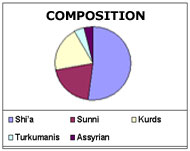Governing Council selected not elected
The US occupation authorities in Iraq set up what they called a governing council which they hope will lay the groundwork for a future Iraqi regime fully under the mantle of the US.

The 25-member governing council has been composed on sectarian and ethnic grounds:
Shia Arab Muslims: 13
Sunni Arab Muslims: 5
Kurds: 5
Turkmanis: 1
Assyrian: 1
The members have various backgrounds and political affiliations and most of them were living in exile as opponents of the deposed president Saddam Hussein.
The council is said to enjoy the power to nominate and dismiss ministers, direct policy, and is also expected to help draw up a new constitution, which would pave the way for free elections.
But the US-led occupation authority in Iraq, represented by its chief administrator will have the final word and the right to veto the council’s decisions.
The council held its inaugural session on 13 July 2003.
 |
In its first decision the council proclaimed 9 April 2003, the day Baghdad fell to the invading forces, as a national holiday! Two days later, the governing council agreed to establish a war crimes tribunal to officials of the deposed regime.
The council’s members failed to choose one of its members to preside over its sessions. Instead it opted for a rotating leadership choosing from the nine-member committee in alphabetical order.
On July 30 the council named Ibrahim Jafari, from the Shiite fundamentalist Dawa party, as the US-approved body’s first president.
Members of Iraq’s governing council:
1. Samir Shakir Mahmoud (Sunni)
2. Sondul Chapouk (Turkumani)
3. Ahmed Chalabi, Iraqi National Congress (Shia)
4. Naseer al-Chaderchi, National Democratic Party (Sunni)
5. Adnan Pachachi, former foreign minister (Sunni)
6. Mohammed Bahr al-Ulloum, cleric from Najaf (Shia)
7. Massoud Barzani, Kurdistan Democratic Party (Sunni Kurd)
8. Jalal Talabani, Patriotic Union of Kurdistan (Sunni Kurd)
9. Abdel-Aziz al-Hakim, Supreme Council for the Islamic Revolution (Shia)
10. Ahmed al-Barak, human rights activist (Shia)
11. Ibrahim al-Jaafari, Daawa Islamic Party (Shia)
12. Raja Habib al-Khuzaai, southern tribal leader (Shia)
13. Aqila al-Hashimi, foreign affairs expert (Shia)
14. Younadem Kana, Assyrian Democratic Movement (Assyrian Christian)
15. Salaheddine Bahaaeddin, Kurdistan Islamic Union (Sunni Kurd)
16. Mahmoud Othman (Sunni Kurd)
17. Hamid Majid Mousa, Communist Party (Shia)
18. Ghazi Mashal Ajil al-Yawer, northern tribal figure (Sunni)
19. Ezzedine Salim, Daawa Islamic Party (Shia)
20. Mohsen Abdel Hamid, Iraqi Islamic Party (Sunni)
21. Iyad Allawi, Iraqi National Accord (Shia)
22. Wael Abd al-Latif, Basra governor (Shia)
23. Mouwafak al-Rabii (Shia)
24. Dara Noor Alzin, judge
25. Abdel-Karim Mahoud al-Mohammedawi, Hizb Allah from Amara (Shia)
Go back: Special Report